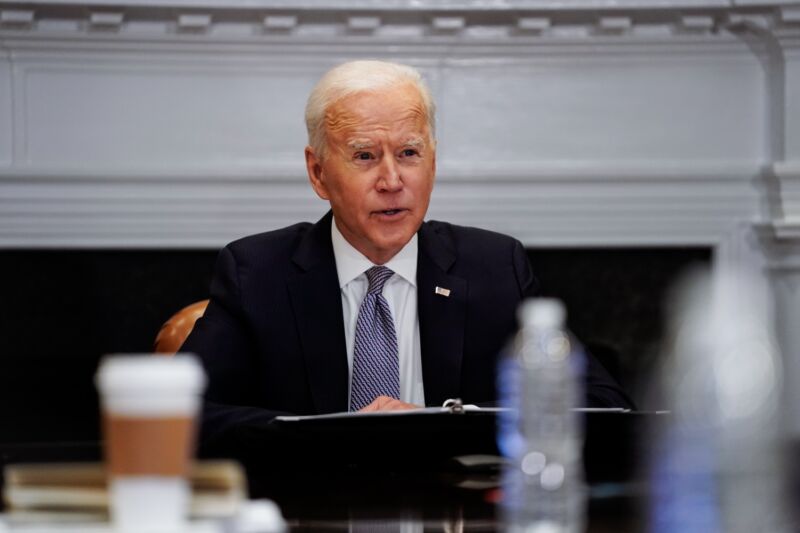
President Joe Biden’s failure to break the Federal Communications Commission’s 2-2 partisan deadlock is reaching a “critical point,” 57 advocacy groups wrote in a letter to Biden and Vice President Kamala Harris Friday.
Nearly five months after his inauguration, Biden has not yet nominated a Democratic FCC commissioner to fill the empty fifth slot. Democrat Jessica Rosenworcel has been leading the commission as acting chairwoman, but she lacks the majority needed to do anything opposed by the FCC’s two Republicans, such as reinstating net neutrality rules and reversing former Chairman Ajit Pai’s deregulation of the broadband industry. Even a step like raising the FCC’s broadband-speed standard—which hasn’t changed in over six years—will likely require a party-line vote because Republicans prefer a low speed standard for the FCC’s annual report on how many Americans lack modern broadband access.
In early April, over 100,000 people signed a petition urging Biden to quickly break the FCC deadlock. Advocacy groups are frustrated that they are still waiting. Why Biden is taking so long is unclear.
“Given the legislative calendar and the diminishing number of days for hearings and confirmation votes, we have reached a critical point to guarantee the agency charged with ensuring affordable communications access can do its work during your administration,” the groups wrote in their new letter.
Senate takes months to approve nominees
Senate Republicans cemented the 2-2 deadlock in December 2020 by confirming a Trump nominee during the lame-duck session before Democrats took control of the White House and Senate. If not for that confirmation, the FCC would have had a 2-1 Democratic majority heading into Biden’s presidency.
Even if Biden were to nominate someone today, months could go by before the FCC has a Democratic majority because of the lengthy Senate confirmation process. For example, Biden nominated Lina Khan to the Federal Trade Commission on March 22, and she is expected to finally receive a confirmation vote on the Senate floor this week.
Even once there is a Democratic majority, complicated rule-makings could take a long time. During Obama’s second White House term, FCC Chairman Tom Wheeler took office in November 2013, made his first net neutrality proposal in April 2014, and led a vote to impose net neutrality rules in February 2015. The rules took effect in June 2015.
Biden’s broadband goals
Biden in March proposed spending $100 billion to deploy high-speed Internet access to all who lack it in the US, with municipal broadband providers getting priority access to that funding. He also promised action to lower prices, saying that ISPs charge too much. But he’s already cut his spending plan to $65 billion in the face of opposition from Republicans and private ISPs such as AT&T. They want to maintain the status quo in which private ISPs get most of the government funding and face little competition or pressure to lower their rapidly rising prices.
The advocacy groups’ letter praised Biden for recognizing the problems in the US broadband market but said he must act more quickly:
The emergency funding allocated and deployed through COVID-19 economic relief legislation and the billions proposed in the American Jobs Plan to close the digital divide are crucial measures. Time and again, your administration has demonstrated a deep understanding that broadband access is critical to education, work, health and wellbeing, and can literally be a matter of life and death.
Yet, as we move toward the second half of 2021 with no nomination for the fifth and final commissioner, the Federal Communications Commission remains below full capacity, which is incompatible with the goal of delivering open, affordable and reliable high-speed broadband to every home. This is all the more urgent given the fact poor families and people of color are disproportionately disconnected from high-speed Internet access, compounding grave inequalities that were made worse during the pandemic.
Restoring net neutrality
The groups that signed the letter include Demand Progress, Fight for the Future, Free Press Action, Public Knowledge, Institute for Local Self-Reliance, Mozilla, National Consumer Law Center, National Digital Inclusion Alliance, National Hispanic Media Coalition, Consumer Reports, Electronic Frontier Foundation, Communications Workers of America, American Library Association, and various others.
The groups told Biden that a fifth commissioner will allow the FCC to “reclassify broadband Internet access as a Title II service to ensure fair and equitable access for everyone and to reinstate strong net neutrality protections.” A 3-2 Democratic majority would also be able to “remedy previous neglect of the Lifeline program that supports low-income access to communications; create rules to make our nation’s networks more reliable and resilient; help guide the deployment of new broadband infrastructure built with federal dollars to make it as effective as possible; approve emergency waivers for E-rate funded infrastructure to be opened up for remote education; [and] meet the challenge of the 2018 Broadcast Ownership Quadrennial Review and halt the dangerous trend towards consolidated ownership in broadcasting by reasserting principles of localism, competition, and ownership diversity.”
The letter concluded:
The FCC, as an expert agency with a mandate from Congress, has the singular ability to act as an empowered advocate to ensure affordable and reliable communications for all. The pandemic showed us the unshakable image of children doing their classwork from fast-food parking lots using borrowed WiFi. We cannot let those students or any family wait any longer. We urge the administration to not lose any more time and to nominate a fifth commissioner who is dedicated to bringing open, affordable and reliable Internet access to all and fulfilling all of these vital goals.
https://arstechnica.com/?p=1773260

